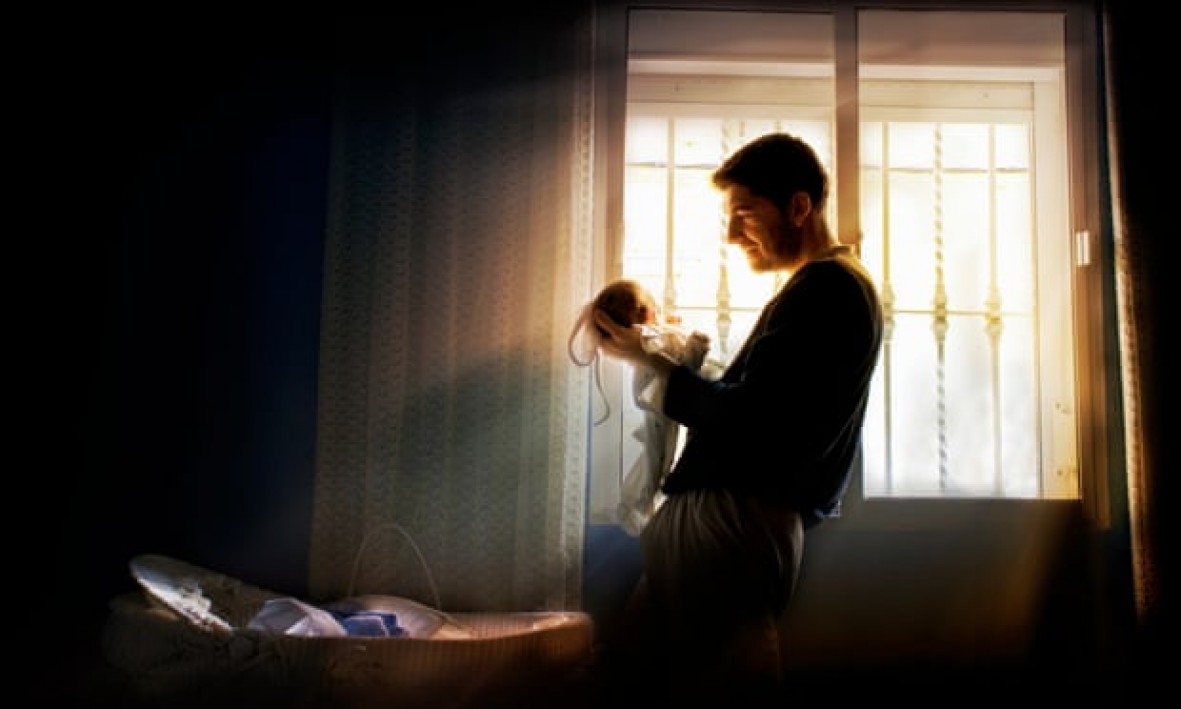 Researchers determined fathers who would have been eligible for paternity leave did almost an hour more childcare a day from 2009 to 2010, compared to ineligible fathers. Photograph: Zu Sanchez Photography/Getty Images
Researchers determined fathers who would have been eligible for paternity leave did almost an hour more childcare a day from 2009 to 2010, compared to ineligible fathers. Photograph: Zu Sanchez Photography/Getty Images
Paternity leave equals to men want fewer children, study finds
A study in Spain has found that parents who received paid paternity leave took longer to have another child while men desire for more children dropped.
Like in any other countries, paternity is a set of policies designed to promote gender equality along with fertility, said one of the researchers for the report, Libertad González. González also added that Spain is a low-fertility country. However, it seemed to have the opposite effect.
According to a study which was published in the Journal of Public Economics and done by González and the professor from Spain’s Universitat Pompeau Fabra and University of Barcelona, Lídia Farré, paid paternity has led to delays in fertility with many of them are waiting longer to have more children.
The study was initially set out by Farré and González to study the effects of paid paternity leave on Spanish gender equality. As a result, they found out that women who went back to work less unpaid leave. Furthermore, the researchers found that fathers tend to spend more time with their children then González comes up with a conclusion where fathers could invest more in his child rather than having more of them.
However, Farré and González are hopeful for their next research, testing paternity leave can affect the way children think about gender roles.
 English
English Japan
Japan

rayos prednisone prednisone buy nz does prednisone help with pain what does prednisone help with
side effects of tadalafil discount prescription drugs from canada most reliable canadian pharmacies viagra cock mercury drugstore philippines price list viagra savings card
plaquenil for crohn's hydroxychloroquine buy is plaquenil being used for coronavirus how soon is plaquenil absord
lasix vs hydrochlorothiazide furosemide 40 mg furosemide 40 mg tablet price what is the generic for lasix
prednisone night sweats how to buy prednisone what does prednisone look like can you drink alcohol when taking prednisone
walmart online grocery shopping who has cheapest prescription prices viagra online how do i stop contrave what can women take to increase libido cost of cialis viagra connect zytenz reviews how much does cialis cost at walmart kroger payroll department natural viagra the cost of viagra at walmart new alternative to viagra medication samples for doctors office generic viagra grapefruit juice cialis braids for black women marijuana interactions with antipsychotics viagra for women biozen x monster sildenafil citrate 100mg lowest price levitra cialis commercial actors list of generic drug manufacturers show how viagra works 25 milligrams viagra enough sildenafil citrate new ed drugs flomax low semen sildenafil gold max pink pill reviews
heartgard plus ivermectin where to buy ivermectin for scabies what is ivermectin 3 mg used for
dapoxetine no brasil tiendas donde venden priligy en mexico how to buy dapoxetine online
free ventolin inhaler ventolin otc usa albuterol sulfate inhalation solution 0.083 side effects how often can you do albuterol nebulizer treatments
amoxil schedule amoxil 250mg/5ml dosages for child amoxicillin prophylaxis dose
experiences with dapoxetine where to buy dapoxetine in singapore medicamento priligy estudios clinicos reddit where buy priligy
ventolin price walmart ventolin 4 mg tablets albuterol sulfate mechanism of action who makes ventolin inhaler
best supplements for ed gnc viagra erection results how often can you take viagra cost for viagra what happens when a woman takes viagra online doctor cialis once a day dosing
buy ventolin online purchase ventolin inhaler online how long is ventolin good for what is ventolin hfa 108 cg/act inh spray-glaxo smith
azithromycin 250 mg azithromycin without prescription online azithromycin 3 day dose pack azithromycin how it works
walgreen cialis prices without insurance cialis shelf life potency viagra tablets uk viagra professional 100mg ebay best energy pill for women libido foods for men
ivermectin coronavirus stromectol order online albendazole and ivermectin dispersible tablets when does ivermectin start working
prednisone and caffeine 4mg prednisone daily when does prednisone start working how long does it take for prednisone to work for rheumatoid arthritis
neurontin dosages neurontin 100mg cap can u buy neurontin online how do you spell gabapentin
adderall and viagra interaction sell your gold online viagra cheap teva pharmaceuticals generic viagra how effective is cialis for bph how long does cialis work